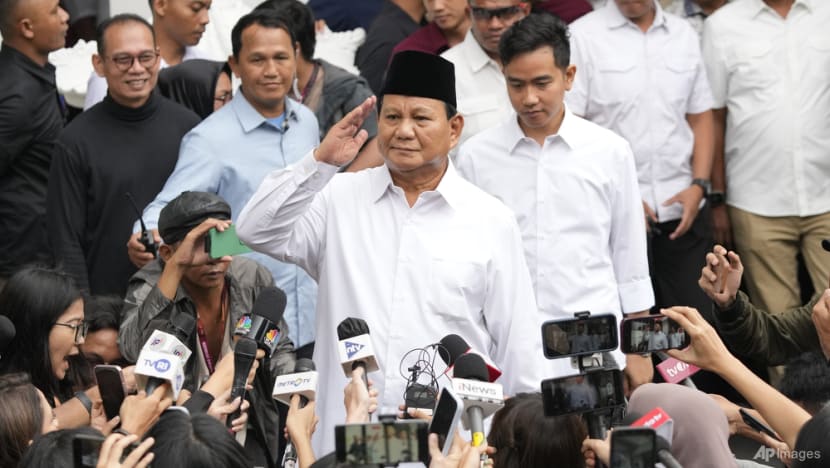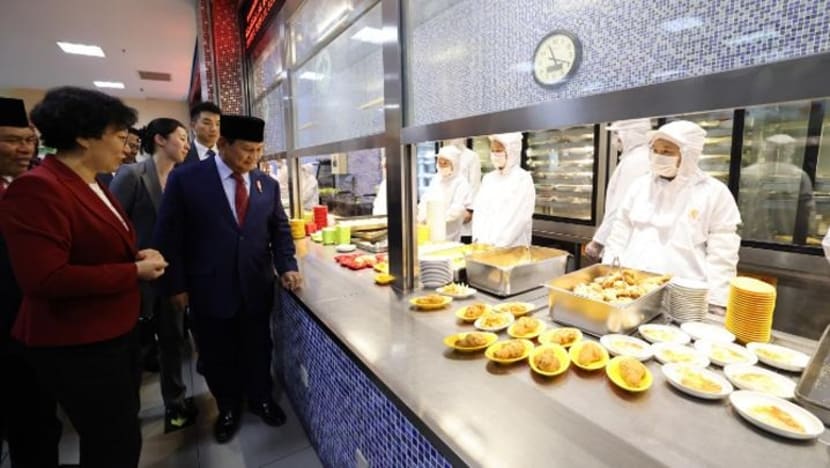To cut or not to cut – Indonesian president-elect Prabowo's free lunch initiative under spotlight over funding
The free lunch programme was the signature election promise of Mr Prabowo’s presidential campaign. However, incoming vice-president Gibran Rakabuming Raka has denied reports that funds allocated for children’s meals could be halved.


This audio is generated by an AI tool.
JAKARTA: To cut or not to cut – Indonesia’s president-elect Prabowo Subianto’s proposed free meal initiative has come under spotlight again over funding issues.
An economist involved in the programme has claimed that its budget would be slashed, potentially halving the original allocation of 15,000 rupiah (US$0.93) per child for five days a week to 7,500 rupiah.
However, Mr Prabowo’s deputy and incoming vice-president Gibran Rakabuming Raka has pushed back against the claims.
The Free Nutritious Meal programme, previously known as the Free Lunch programme before its rebranding in May, aims to address child malnutrition.
The change in budget was first revealed by Mr Heriyanto Irawan, an economist and managing partner at Verdhana Sekuritas, a securities firm based in Jakarta.
Speaking at the Market Outlook 2024 event on Tuesday (Jul 16), Mr Heriyanto explained that reducing the meal budget would keep the programme within its budget ceiling of 71 trillion rupiah (US$4.4 billion) while maintaining the government's annual budget deficit, capped at 2.5 per cent.
He emphasised that Mr Prabowo does not intend to raise the current 3 per cent budget deficit cap to fund his ambitious programme, despite concerns raised by some analysts.
Mr Heriyanto was asked by Mr Prabowo’s synchronisation team to discuss the free lunch programme.
The team, formed to align the policies of President Joko Widodo's outgoing administration and Mr Prabowo’s incoming administration, comprises top officials from Mr Prabowo’s Great Indonesia Movement Party (Gerindra). They include his nephews, Mr Thomas Djiwandono and Mr Budisatrio Djiwandono.
Mr Widodo is set to appoint Mr Thomas as the new deputy minister of finance, effective Thursday, according to Reuters.
Mr Sufmi Dasco Ahmad, another member of the synchronisation team, confirmed that Mr Thomas will continue in the role after Mr Prabowo takes office on Oct 20.
On Thursday (Jul 18), however, vice president-elect Gibran denied that the free lunch budget would be slashed, reiterating that the budget allocation will remain at 15,000 rupiah per child.
“Who said it would be cut? The budget remains 15,000 rupiah; there is no plan to cut it," Mr Gibran said at the Solo City Hall, as quoted by media outlet Kumparan.
He even announced that a free meals trial would begin in late July at schools in Solo, the Central Javan city that he is mayor of.

According to data from the United Nations Children’s Fund (UNICEF), an estimated one in five children in Indonesia suffers from stunted growth.
However, analysts have warned that the cost of Mr Prabowo's free lunch initiative for some 82.9 million Indonesian children could undermine Indonesia's track record of fiscal discipline.
The fiscal deficit for 2024 has been set at 2.29 per cent of its gross domestic product (GDP).
Under Indonesia’s state finance law, which was enacted in the wake of the 1997 Asian financial crisis as a safeguard, the state’s annual budget deficit is capped at 3 per cent of GDP and the debt-to-GDP ratio, at 60 per cent.
An earlier estimate had put the programme’s cost at approximately 450 trillion rupiah (US$27.86 billion) annually, but the government would only earmark 71 trillion rupiah in the proposed 2025 budget.
The incoming administration also plans to continue with other costly initiatives, such as the development of the country’s new capital Nusantara (IKN), expected to cost US$32 billion over the next couple of decades.
"The key is to manage this free lunch programme within the allocated budget of 71 trillion rupiah, without expanding it to 200 trillion rupiah or more," Mr Heriyanto said.
The proposal to lower the meal costs, Mr Heriyanto added, is also seen as a way for Mr Prabowo to make the programme accessible to as many Indonesian children as possible.
Mr Airlangga Hartarto, coordinating minister for economic affairs, has confirmed that the proposed budget allocated for the free meal programme in the state budget remains unchanged for 2025. However, there will be flexibility in its implementation to adhere to the budget ceiling while meeting operational needs.
"In the 2025 state budget (for free lunch), it remains the same, but the implementation will have flexibility," Mr Airlangga told local media in Jakarta on Tuesday.
Mr Budiman Sudjatmiko, a senior member of Mr Prabowo’s presidential campaign team, stressed that the primary concern should be the nutritional quality of meals, rather than the cost per portion.
He told Kompas on Wednesday that the government would explore sourcing of food ingredients independently through community kitchens or village enterprises, to maintain cost stability as well as nutritional standards.
"The issue isn't just about the price per portion; it's about providing nutritious food. Prices can vary significantly when viewed from the perspective of end consumers," Mr Budiman said.














